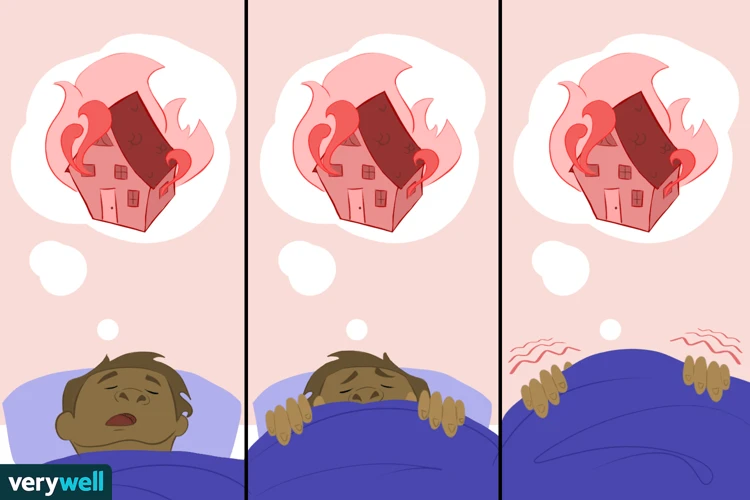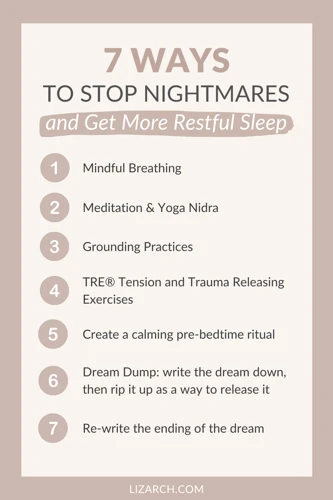As we lay down to rest after a long day, we expect our dreams to bring us tranquility and wonder. However, for some of us, this is not always the case. Recurrent nightmares can plague our evenings, leaving us with a feeling of dread and unease. It can be frustrating to continuously endure these recurring dreams without any apparent relief. But don’t give up hope just yet. In this article, we’ll delve into the causes of recurrent nightmares, identify their triggers, and explore effective methods to finally get a good night’s sleep. So, lay down, close your eyes, and let’s begin this journey towards peaceful, dreamless nights.
Understanding Recurrent Nightmares

Sleep is an essential part of our daily routine that rejuvenates our body and mind. However, it can become a source of distress for some individuals who experience recurrent nightmares. Understanding the reasons behind these nightmares can help in finding ways to overcome them. In this section, we will explore the nature of recurrent nightmares and the underlying factors that trigger them. By gaining a deep understanding of this phenomenon, you will be better equipped to tackle your nightmares head-on.
What Are Recurrent Nightmares?
Recurrent nightmares are disturbing dreams that repeat themselves over time. They can happen to anyone, regardless of age or gender. These nightmares can be very vivid and may cause intense emotions such as fear, anxiety or helplessness. People who experience recurrent nightmares may feel that they have no control over their dreams, but there are ways to overcome them.
Here are some characteristics of recurrent nightmares:
- Repetition: Recurrent nightmares are characterized by the repetition of similar themes, characters and events in one’s dreams.
- Intensity: Recurrent nightmares can cause intense emotions that can sometimes linger even after one wakes up.
- Duration: Recurrent nightmares can happen over a long period of time, sometimes even for years.
- Disturbance: Recurrent nightmares can disrupt sleep, leading to feelings of fatigue and lethargy during the day.
It’s important to note that occasional nightmares are a common experience for most people, and they are not necessarily a cause for concern. However, if the nightmares become recurrent and start to affect one’s quality of life, it may be helpful to explore ways to overcome them.
Why Do We Have Recurring Nightmares?
It can be perplexing to experience recurring nightmares, especially when you don’t know the reason behind them. Here are some common reasons why we have recurring nightmares:
| Reason | Description |
|---|---|
| Psychological Issues | Recurring nightmares can be a symptom of underlying psychological issues such as anxiety, depression, or post-traumatic stress disorder (PTSD). These issues can lead to negative thought patterns and fears that are reflected in our dreams. |
| Life Stressors | Stressful events in our daily lives such as job loss, financial problems, or relationship issues can cause us to have recurring nightmares. Our stress and anxiety can manifest in our dreams and cause us to relive or replay these stressors in our sleep. |
| Physical Health Issues | Certain physical health issues such as sleep apnea, insomnia, or other sleep disorders can disrupt our sleep and cause nightmares. Additionally, medications or the withdrawal from certain medications can cause vivid and disturbing dreams. |
| Traumatic Events | Experiencing a traumatic event such as physical or emotional abuse, a car accident, or witnessing violence can cause our brain to replay the event in our dreams. Our nightmares can serve as a way for us to process and cope with the trauma. |
Identifying the reason behind your recurring nightmares can be helpful in finding ways to overcome them. Whether through therapy, stress management techniques or lifestyle changes, taking action to address the root cause of your nightmares can lead to better sleep and ultimately, a better quality of life.
Identify the Triggers of Your Nightmares

Identifying the triggers of your nightmares is an essential first step in overcoming them. Some of the most common triggers of recurring nightmares include stress, anxiety, trauma, and certain medications.
Stress: Stress and anxiety are among the leading causes of nightmares in adults. Stressful situations can trigger the release of cortisol, a hormone that prepares the body for fight or flight responses. This can disrupt sleep and cause nightmares.
Anxiety: Similarly, anxiety can cause a variety of sleep disturbances, including nightmares. People with anxiety disorders may experience more intense and frequent nightmares than those without.
Trauma: Trauma, such as physical or emotional abuse, can also lead to frequent nightmares. Trauma survivors may experience vivid and terrifying dreams that relive the traumatic event.
Medications: Some medications, including certain antidepressants, can cause nightmares. If you suspect that your medication may be contributing to your nightmares, talk to your doctor about switching to a different medication.
Once you have identified the triggers of your nightmares, you can take steps to address them. For example, if stress is a trigger, you may need to find ways to manage your stress levels, such as practicing relaxation techniques or seeking counseling. If medication is the culprit, your doctor may be able to adjust your dosage or switch to a different medication. By addressing the underlying triggers of your nightmares, you can take control of your sleep and reduce the frequency and intensity of your nightmares.
Establish a Relaxing Bedtime Routine

Making sure your body and mind are relaxed before bedtime can significantly reduce the likelihood of experiencing recurrent nightmares. Because stress and anxiety can increase the frequency of these nightmares, establishing a relaxing bedtime routine can help you unwind and prepare for a peaceful night’s sleep. In this section, we will explore various techniques and practices to create a calming bedtime routine that will help you sleep better and reduce the occurrence of nightmares.
Limit the Use of Electronic Devices
Electronic devices like smartphones, tablets, and laptops emit a blue light that can disrupt our internal clock and inhibit our ability to fall asleep. By decreasing our exposure to these devices before bedtime, we can improve the quality of our sleep and reduce the likelihood of experiencing recurrent nightmares. Below are some strategies for limiting the use of electronic devices:
| Strategy | Description |
| Avoid screen time before bed | Staring at screens can suppress the production of melatonin, a hormone that regulates sleep. Try to avoid using these devices at least one hour before bedtime. |
| Reduce screen time during the day | The more you use electronic devices during the day, the more likely you are to use them at night. Try to reduce your daytime use of these devices as much as possible. |
| Use night mode | Most devices now have a “night mode” feature that reduces the amount of blue light they emit. This can make nighttime device use less disruptive to sleep. |
| Charge devices outside the bedroom | Leaving your device charging in another room forces you to physically disconnect from it before bedtime and reduces the temptation to use it during the night. |
By limiting the use of electronic devices before bed, you can create a peaceful environment that promotes relaxation and reduces the likelihood of experiencing recurrent nightmares.
Sleep in a Comfortable Environment
It is important to create a comfortable sleep environment to avoid recurrent nightmares. Here are some tips to help you do that:
- Choose a comfortable mattress: A good mattress can make all the difference when it comes to getting a good night’s sleep. Invest in a comfortable and supportive mattress that suits your sleeping style.
- Use comfortable and clean bedding: Soft and clean bedding can make a big difference to your sleep. Choose bedding that you find comfortable and try to use freshly washed sheets and pillowcases.
- Maintain a comfortable temperature: Your bedroom temperature should be comfortable, neither too hot nor too cold. Keep your room well-ventilated and use air conditioning, fans, or extra blankets as needed.
- Keep the room dark: Darkness signals to the brain that it is time to sleep. Use curtains or blinds to block out any light coming from outside and consider using a sleep mask if necessary.
- Reduce noise: Noise can be a major distraction that interferes with quality sleep. Use earplugs, noise-cancelling headphones, or a white noise machine to block out unwanted noise.
By following these tips, you can create a comfortable and conducive environment for quality sleep, which can help reduce the chance of recurrent nightmares.
Try Meditation or Deep Breathing Exercises
When it comes to overcoming recurrent nightmares, meditation and deep breathing exercises can be very effective in reducing stress and anxiety levels that may contribute to nightmares. Here are some tips for incorporating these practices into your bedtime routine:
- Meditation: Find a quiet and comfortable place to sit or lie down. Focus on your breath and try to clear your mind of any thoughts. You can use a guided meditation or simply focus on your breathing for 10-15 minutes before going to bed. This can help you relax and reduce any anxiety or stress that could be causing your nightmares.
- Deep Breathing Exercises: Sit or lie down in a comfortable position and take slow, deep breaths in through your nose and out through your mouth. Focus on your breathing and try to slow it down gradually. This can help calm your mind and body, making it easier to fall asleep and stay asleep throughout the night.
- Combining Meditation and Deep Breathing: You can also combine these practices by using deep breathing as a way to focus your mind during meditation. Count your breaths or repeat a calming phrase to yourself with each inhale and exhale to help you stay present and relaxed.
Incorporating these practices into your bedtime routine can help you calm your mind and body, reduce stress and anxiety, and promote a more restful sleep.
Practice Visualization and Self-Reflection

One way to address recurrent nightmares is to engage in visualization and self-reflection techniques. By actively visualizing positive outcomes and exploring the unconscious mind through self-reflection, individuals may find relief from the distress caused by persistent nightmares. In this section, we’ll explore various techniques for practicing visualization and self-reflection to overcome recurrent nightmares.
Visualize a Positive Outcome
One effective method to overcome recurrent nightmares is to visualize a positive outcome. This involves imagining a scenario in which the nightmare ends well, and focusing on this positive outcome during waking hours. Here are some steps you can take to visualize a positive outcome:
- Identify the negative outcome: Start by identifying what usually happens in your nightmare. What is the scary or unpleasant event that you experience? Be as specific and detailed as possible.
- Imagine a positive outcome: Once you have a clear picture of the negative outcome, start to imagine a positive outcome instead. For example, if you usually dream about falling off a cliff, visualize yourself floating gently to the ground instead.
- Engage your senses: To make the visualization more vivid, engage all your senses. What do you see, hear, feel, smell or taste? Use these sensory details to create a more immersive experience.
- Repeat the visualization: Practice the visualization technique every day, until it becomes a habit. Whenever you start to feel anxious or fearful, think about the positive outcome instead.
- Use affirmations: Affirmations are positive statements you can use to reinforce your visualization. For example, you could say to yourself, “I am safe and secure” or “I am strong and capable”. Repeat these affirmations throughout the day, especially when you feel anxious.
Visualizing a positive outcome can help to reprogram your mind to think more positively. By focusing on a positive outcome, you can reduce the likelihood of having recurrent nightmares and enjoy a more restful sleep.
Keep a Dream Journal
Keeping a dream journal can be a helpful tool in overcoming recurrent nightmares. Writing down your dreams can help you identify patterns and triggers for your nightmares, as well as provide insight into your subconscious mind.
To create a dream journal, you can use a notebook or a dedicated app. It’s important to write down every detail you can remember about your dreams, even if they seem insignificant. This includes the setting, characters, feelings, and events.
To help organize your dream journal, you can use a table with different columns for each element of the dream. Here is an example:
| Date | Setting | Characters | Feelings | Events |
|---|---|---|---|---|
| 6/15/21 | In a dark forest | A shadowy figure, myself | Anxious, scared | Being chased by the shadowy figure through the forest |
| 6/16/21 | In a crowded city | My family, friends | Happy, content | Exploring the city and discovering new places |
By keeping a consistent dream journal, you can start to identify common themes and triggers for your nightmares. For example, if you notice that you often dream about being chased in dark places, you may have a fear of vulnerability or being alone.
Additionally, reflecting on your dreams and the emotions they evoke can also be helpful in processing and understanding any underlying issues that may be contributing to your nightmares.
Keeping a dream journal can be a valuable tool in overcoming recurrent nightmares, providing insight into your subconscious mind and helping you identify patterns and triggers for your nightmares.
Consider Seeking Therapy
Therapy is often an effective way to overcome recurrent nightmares, especially if they are related to past traumatic experiences. If your nightmares are causing significant distress or affecting your daily life, it may be beneficial to seek the help of a licensed therapist or counselor. Here are some types of therapy that may be helpful:
- Cognitive Behavioral Therapy (CBT): CBT is a type of therapy that focuses on identifying and changing negative thought patterns and behaviors. A therapist can work with you to identify the underlying causes of your nightmares and help you develop coping strategies to manage them.
- Eye Movement Desensitization and Reprocessing (EMDR): EMDR is an evidence-based treatment for trauma-related disorders that involves processing distressing memories while simultaneously experiencing bilateral stimulation (e.g. eye movements or tapping). A therapist trained in EMDR can help you process the traumatic experiences that may be contributing to your nightmares and reduce their frequency.
- Exposure Therapy: Exposure therapy involves gradually exposing yourself to feared situations or stimuli in a safe and controlled environment. This can be helpful for nightmares related to specific phobias or traumatic experiences.
- Imagery Rehearsal Therapy (IRT): IRT involves visualizing and rehearsing positive outcomes to replace the negative content of nightmares. This can be helpful for reducing the frequency and intensity of recurrent nightmares.
It’s important to find a therapist who is experienced in treating recurrent nightmares or trauma-related disorders. You can ask for recommendations from your doctor or search online for therapists who specialize in these areas. With the help of a therapist, you can learn to manage your nightmares and improve your quality of life.
Make Lifestyle Changes to Improve Sleep Quality

Achieving a restful and rejuvenating sleep is essential for maintaining a productive and healthy lifestyle. However, certain factors such as stress, dietary choices, and lifestyle habits can impede the quality of our sleep, making it difficult to overcome recurrent nightmares. It is crucial to implement positive changes in our lifestyle to improve the quality of our sleep and overall well-being. In this section, we explore some of the lifestyle changes that can help alleviate the symptoms of recurring nightmares and promote better sleep.
Exercise Regularly
Regular exercise has been shown to have numerous health benefits, including improving sleep quality and reducing stress and anxiety levels. Exercising regularly has been found to help alleviate the symptoms of depression and PTSD, both of which can contribute to recurrent nightmares. Here are some tips for incorporating exercise into your daily routine:
- Start slow: If you’re new to exercise, start with light activities such as walking or yoga, then gradually increase the intensity and duration of your workouts.
- Find a workout partner: Having someone to exercise with can keep you motivated and hold you accountable.
- Vary your exercises: Incorporating different types of exercise such as cardio, strength training, and flexibility exercises can prevent boredom and help tone different parts of your body.
- Set achievable goals: Setting realistic fitness goals can boost your confidence and help you stay on track. Keep track of your progress and celebrate your milestones!
- Stay active throughout the day: In addition to structured exercise, try to stay active throughout the day by taking the stairs instead of the elevator, walking on your lunch break, or doing some stretching or yoga before bed.
Remember, incorporating exercise into your routine can have a positive impact on both your physical and mental well-being, and help you overcome recurrent nightmares.
Eat Healthy and Avoid Stimulants
Maintaining a healthy diet is important for overall well-being and can also help reduce the frequency and severity of nightmares. Eating a balanced diet with a variety of whole foods can provide the nutrients necessary for a good night’s sleep. Avoiding certain foods and drinks that act as stimulants can also be helpful.
Here is a table outlining some foods and drinks to avoid and those that can promote a restful night’s sleep:
| Foods and Drinks to Avoid: | Foods and Drinks to Promote Sleep: |
|---|---|
|
|
In addition to eating a healthy diet, it is important to avoid eating large meals close to bedtime, as this can make it more difficult to fall asleep. Instead, try to have a light snack or meal a few hours before bedtime.
By avoiding stimulants and consuming a healthy diet, you can improve your sleep quality and potentially reduce the occurrence of nightmares.
Practice Good Sleep Hygiene
Good sleep hygiene involves adopting practices that promote healthy sleep habits. Here are some tips to improve your sleep hygiene:
- Stick to a regular sleep schedule: Try to go to bed and wake up at the same time every day, even on the weekends. This helps regulate your body’s internal clock and improve your sleep quality.
- Create a relaxing bedtime routine: Wind down before bed with calming activities such as reading or taking a warm bath. Avoid stimulating activities or bright screens, like watching TV or using the phone, as they can interfere with your sleep.
- Make your bedroom conducive to sleep: Keep your bedroom dark, cool, and quiet. Use curtains or an eye mask to block out light, and earplugs or white noise machine to reduce noise. Make sure your mattress and pillows are comfortable and supportive too.
- Avoid caffeine, alcohol, and nicotine: These substances can interfere with your sleep quality and cause sleep disturbances. Limit or avoid them altogether.
- Don’t eat heavy meals close to bedtime: Eating a heavy meal, especially spicy or acidic foods, can cause indigestion and disrupt your sleep. Try to finish eating at least 2-3 hours before bedtime.
- Avoid daytime naps: While napping can be a refreshing activity, it can also interfere with your nighttime sleep. If you must nap, limit it to 30 minutes in the early afternoon.
- Get regular exercise: Exercise has been shown to promote healthy sleep, but be sure to finish your workout at least 3 hours before bedtime to give your body time to wind down.
By practicing good sleep hygiene, you can create a sleep-conducive environment and establish healthy habits that can promote restorative sleep and reduce the likelihood of nightmares.
Consider Lucid Dreaming
One alternative method to overcome recurrent nightmares is through the practice of lucid dreaming. This technique involves being aware that you are dreaming while you are in the dream state, giving you the ability to control the events and outcome of the dream. While it may seem like a daunting practice, with some patience and practice, lucid dreaming can be a powerful tool in overcoming recurring nightmares. In this section, we will explore what lucid dreaming is, how to induce it, and how to use it to overcome nightmares.
What is Lucid Dreaming?
Lucid dreaming is a technique that involves becoming aware when you are dreaming, allowing you to control and manipulate the dream experience. A lucid dreamer is able to experience a dream as if it were real, while also being aware that they are dreaming. This can lead to incredible experiences and even be used to overcome nightmares.
To better understand lucid dreaming, the following table outlines some key characteristics:
| Characteristic | Description |
| Awareness | Becoming aware when you are dreaming |
| Control | Being able to manipulate the dream experience |
| Realism | Experiencing the dream as if it were real |
| Consciousness | Being conscious of the fact that you are dreaming |
| Memory | Being able to remember the dream experience |
Lucid dreaming can be induced through various techniques such as reality testing, which involves regularly checking whether you are dreaming or not, and wake back to bed, which requires waking up in the middle of the night and going back to sleep with the intention of having a lucid dream.
Using lucid dreaming to overcome recurrent nightmares involves practicing techniques such as visualization and positive affirmations within the dream state. By becoming aware that you are dreaming, you can confront your fears and change the outcome of the nightmare. This can help reduce the frequency and intensity of recurring nightmares.
How to Induce Lucid Dreaming
Lucid dreaming, or being aware that you are dreaming while in the dream state, can be a helpful tool in overcoming recurrent nightmares. Here are some tips on how to induce lucid dreaming:
- Keep a dream journal: Write down your dreams as soon as you wake up. This will help you become more familiar with the content and patterns of your dreams and make it easier to recognize them while you are asleep.
- Do reality checks: Throughout the day, ask yourself whether you are awake or dreaming. Count your fingers, try to push your hand through a solid object, or look at a clock twice to see if the time changes. This habit will carry over into your dream state and help you recognize when you are dreaming.
- Practice meditation: Before going to bed, practice meditation or relaxation exercises to clear your mind of distractions and prepare yourself for a meditative state while sleeping.
- Try the Wake-Back-to-Bed method: Set an alarm for 4-6 hours after you go to bed, wake up and stay awake for 15-30 minutes, and then go back to sleep with the intention of having a lucid dream.
- Use a lucid dreaming technique: There are several techniques you can try, such as the MILD (Mnemonic Induction of Lucid Dreams) technique, which involves repeating a mantra such as “I will have a lucid dream” while falling asleep, or the WILD (Wake-Induced Lucid Dreaming) technique, which involves staying awake while your body falls asleep.
By practicing these techniques regularly, you may be able to induce lucid dreaming and take control of your nightmares. However, it’s important to remember that not everyone is able to lucid dream, and it may take time and practice to achieve.
Use Lucid Dreaming to Overcome Nightmares
Another technique to overcome recurrent nightmares is through the practice of lucid dreaming. Lucid dreaming is a state where you become aware that you are in a dream and can control or direct the content of the dream. This can be a powerful tool for overcoming nightmares as you can change the course of the dream, face your fears and take control of the situation.
Here are some steps for using lucid dreaming to overcome nightmares:
- Keep a dream journal: Recording and keeping track of your dreams can help you identify recurring themes, patterns or triggers that you can control or influence during the dream.
- Reality testing: Make a habit of asking yourself, “Am I dreaming?” throughout the day. This will help you develop the habit of questioning your reality, which can carry over to your dreams.
- Develop a clear intention: Before going to bed, set a clear intention of what you want to achieve in your dreams. For example, you may want to confront your nightmare and change the outcome of the dream.
- Practice visualization: Visualize and imagine a positive outcome for your dream before going to bed. This can help create a positive expectation and intention for your dreams.
- Use reality checks: During your dream, perform reality checks to see if you are really dreaming. For example, try to read a sign or count your fingers. When you realize that you are dreaming, you can take control and direct the dream towards a positive outcome.
Lucid dreaming can take time and practice to master, but it can be a powerful tool for overcoming nightmares and taking control of your dreams. With regular practice and persistence, you can learn to turn your nightmares into opportunities for growth and self-improvement.
Conclusion
After experiencing recurrent nightmares, it is natural to feel distressed and anxious. However, there are numerous things you can do to overcome these nightmares and enjoy a restful night’s sleep.
Understanding the triggers and causes of your nightmares is the first step. Knowing what causes your nightmares can help you identify and develop practical solutions to overcome them. You can then establish a bedtime routine that fosters relaxation and encourages sleep.
Visualization and self-reflection are essential tools in combating nightmares. Visualizing a positive outcome can help shift your mindset from negative to positive, while keeping a dream journal can help you identify patterns and triggers in your nightmares. Additionally, seeking out professional help from a licensed therapist or counselor can help you address the root causes of your nightmares.
Making lifestyle changes can also significantly improve your overall sleep quality, from exercising regularly to practicing good sleep hygiene. Finally, consider lucid dreaming as another tool in your arsenal to overcome nightmares.
By incorporating these tips and tricks into your routine, you can overcome recurrent nightmares and enjoy a restful night’s sleep. Don’t hesitate to seek help from professionals if necessary, and remember to take care of your mental and physical health. Sleep well.
Frequently Asked Questions
What if my nightmares are too intense to handle on my own?
If your nightmares are causing severe distress and interfering with your daily life, it may be beneficial to seek the help of a mental health professional.
How long does it take to overcome recurrent nightmares?
The length of time it takes to overcome recurrent nightmares varies from person to person. It is important to be patient and consistent in implementing methods to reduce their frequency and intensity.
Can sleep medication help with recurrent nightmares?
Sleep medication is not typically recommended for the treatment of recurrent nightmares, as it does not address the underlying issues that contribute to their occurrence.
Is it possible to completely stop having nightmares?
It may not be possible to completely stop having nightmares, but it is possible to reduce their frequency and intensity through various techniques and lifestyle changes.
Can certain foods trigger nightmares?
There is no scientific evidence to suggest that specific foods can trigger nightmares, but consuming heavy meals, alcohol, or caffeine close to bedtime may disrupt sleep and increase the likelihood of having nightmares.
Can daytime stress contribute to recurrent nightmares?
Yes, daytime stress and anxiety can contribute to the frequency and intensity of recurrent nightmares. Implementing stress-reduction techniques during the day may help reduce their occurrence during the night.
What is the role of exercise in overcoming recurrent nightmares?
Exercise can help reduce stress and anxiety, promote relaxation, and improve sleep quality, all of which can contribute to reducing the frequency and intensity of recurrent nightmares.
Is it okay to use visualization techniques if my nightmares are trauma-based?
If your nightmares are related to trauma, it is important to proceed with caution when using visualization techniques. It may be helpful to work with a mental health professional to ensure that these techniques do not trigger or exacerbate trauma-related symptoms.
Can lucid dreaming be dangerous?
Lucid dreaming is generally considered safe for most people, but it is important to exercise caution and establish clear intentions before attempting to induce lucid dreams. People with certain mental health conditions may also be advised to avoid lucid dreaming.
What are some common triggers for nightmares?
Some common triggers for nightmares include stress, anxiety, certain medications, medical conditions such as sleep apnea or restless leg syndrome, and sleep deprivation or disruption. Trauma and PTSD can also lead to frequent nightmares.








